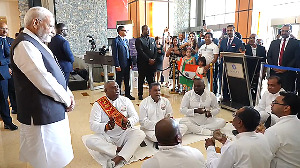Never before has the need for creating an ambience for economic policy reforms been as critical as it is now, points out A K Bhattacharya.

This is probably an apocryphal story, but it underlines a crucial principle of governance in a country such as India.
The story pertains to the late 1990s, when Atal Bihari Vajpayee was prime minister.
A group of Indian business leaders pleaded with Vajpayee to allow foreign investment in the sector in which they operated.
They made a strong case for a policy change and believed that they had convinced the prime minister.
But Vajpayee must have also recognised that his being convinced would not be enough because the idea of allowing foreign investment might not go down well with some elements of his own party and, therefore, needed wider acceptance.
His pithy advice to those leaders was: 'Mahaul banaaiye', or create an ambience.
These leaders did create an ambience in favour of allowing foreign equity in that sector of the economy and a few months later, the Vajpayee government responded by changing its foreign investment policy appropriately.
That perhaps was a different era and it was a government led by a coalition of political parties.
It is difficult to imagine today that government leaders would seek the assistance of those pleading for policy reforms in creating an environment conducive to making the change.
But even today the importance of creating the necessary ambience for a policy change can hardly be underestimated.
Indeed, the need for creating a mahaul has over the years become more important than recommendations by expert committees or by groups of ministers.
Vajpayee had also launched the idea of setting up groups of ministers for tackling important policy issues.
Those groups helped in creating a mahaul within the government, but their impact was relatively limited.
Nevertheless, the practice became quite popular and the succeeding Manmohan Singh government had liked it so much that at the end of its 10-year tenure in 2014, it had as many as 21 groups of ministers, in addition to nine empowered groups of ministers, which were set up to examine various policy issues.
The Narendra Modi government began its tenure in 2014 on a different note.
One of the first decisions it took after its formation in May was to scrap all the empowered groups of ministers and groups of ministers.
But a couple of years later, there was a rethink.
The Modi government also realised the importance of these groups of ministers.
Almost close to a dozen groups of ministers have been set up so far.
But was there an attempt to create the necessary ambience in the country before embarking on a big policy change? Not really.
Note that setting up expert committees or groups of ministers are not akin to creating a mahaul. Even Vajpayee had understood this.
He let his finance minister Yashwant Sinha go ahead with the announcement of reducing government equity in State-owned banks to 33 per cent on the strength of a recommendation made to that effect by the Narasimham committee on banking sector reforms.
But there was no ambience. The proposal was buried quietly.
In contrast, the only successful case of privatisation during the Modi government's eight years was preceded by a clear attempt at creating an ambience.
The process of building an environment for privatising Air India began as early as 2017.
It took four years for the sale of Air India to the Tatas to be completed.
Creating a mahaul takes time and the outcome is realised after some years, but fears of adverse after-effects or a rollback are eliminated.
The Modi government has been planning to privatise a couple of public sector banks for the last few years.
But so far expectations of the government tabling a Bill in Parliament to amend the law suitably to facilitate the sale of these banks have been belied.
There are crucial questions that need to be answered before privatisation of public sector banks could be completed.
No visible attempt at creating a mahaul or even an outreach programme to convince stakeholders of the need for bank privatisation appears to have been made.
The Reserve Bank of India seems to be against diluting the current norms that prevent corporate groups from owning banks.
What happens if there is a corporate group that makes a bid for acquiring a controlling stake in one of these public sector banks to be put up for sale? Public sector banks have strong trade unions.
They are obviously opposed to the idea of privatisation.
What efforts have been made to convince the unions and facilitate privatisation without any hurdle? Recommendations of expert committees or groups of ministers endorsing privatisation of public sector banks would not be of much help.
A mahaul has to be created to blunt the opposition to privatisation.
If necessary, a bargain may have to be struck with the workers.
There are lessons to be learnt from the failure in implementing the farm reform laws.
There were expert committees and experts who recommended those farm policy reforms.
But not enough work was done to create the necessary ambience before rushing with the passage of those farm reform Bills in Parliament.
There are now early signs of the farmers' agitation gaining momentum again.
The government has set up a committee. But that won't be enough. Outreach programmes to explain and understand the point of view of the agitating farmers should be more effective.
The government now intends to amend the electricity law and the Bill has been sent to a parliamentary committee for review.
Many provisions in that law have been opposed by the states.
Here also, the need is to create an ambience for the states to agree to the much-needed changes that would strengthen the power distribution sector.
Similarly, a few states are unwilling to sign on to the new labour codes.
Consultation with the states will always help, particularly because, like the farm and electricity laws, the success of the new labour codes will depend largely on states' participation and involvement.
Lessons from the GST experience should not be forgotten.
The importance of creating a mahaul for ensuring the easy passage of Bills for reforming electricity and privatising banks has gained salience also because of the evolving political situation in the country, and as the date of the next general elections in 2024 comes closer.
Vajpayee's fourth death anniversary was recently commemorated by all the top leaders of the Bharatiya Janata Party, as also of the government.
It would be ironic if, despite the government's top leadership paying homage to Vajpayee on his death anniversary on August 16, the former prime minister's most important governance mantra were to be ignored.
Never before has the need for creating an ambience for economic policy reforms been as critical as it is now.












